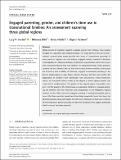Files in this item
Engaged parenting, gender, and children's time use in transnational families : an assessment spanning three global regions
Item metadata
| dc.contributor.author | Jordan, Lucy P. | |
| dc.contributor.author | Dito, Bilisuma | |
| dc.contributor.author | Nobles, Jenna | |
| dc.contributor.author | Graham, Elspeth | |
| dc.date.accessioned | 2018-05-24T10:30:06Z | |
| dc.date.available | 2018-05-24T10:30:06Z | |
| dc.date.issued | 2018-10 | |
| dc.identifier | 252838392 | |
| dc.identifier | 2b8a16e8-2d56-48b0-9552-510d225769ea | |
| dc.identifier | 85047467461 | |
| dc.identifier | 000446458300008 | |
| dc.identifier.citation | Jordan , L P , Dito , B , Nobles , J & Graham , E 2018 , ' Engaged parenting, gender, and children's time use in transnational families : an assessment spanning three global regions ' , Population, Space and Place , vol. 24 , no. 7 , e2159 . https://doi.org/10.1002/psp.2159 | en |
| dc.identifier.issn | 1544-8444 | |
| dc.identifier.uri | https://hdl.handle.net/10023/13520 | |
| dc.description | Funding support for this study is from Singapore Ministry of Education Academic Research Fund Tier 2 (MOE2015‐T2‐1‐008); Hong Kong Research Grants Council through its General Research Fund (Project 17606815); Wellcome Trust UK (GR079946/B/06/Z and GR079946/Z/06/Z). | en |
| dc.description.abstract | Global circuits of migration regularly separate parents from children. How families navigate this separation has changed markedly. The sharp decline in the cost of international communication makes possible new forms of transnational parenting. In many contexts, migrants are now actively engaged parents, involved in decisions, knowledgeable of children's schooling, employment, and activities, and in some cases, even conversant face‐to‐face with children via videoconferencing. These practices, however, are not universal. We use data from surveys in 3 countries to document the frequency and variability of intensive, engaged transnational parenting in the diverse global regions of Asia, Africa, and the Americas. We then ask whether the organisation of children's lives—specifically, time allocated to school homework, leisure, and household chores—varies by the degree to which migrant parents stay connected to sending homes. The gender of the migrant parent, stay‐behind caregiver, and the gender of the child emerge as explanatory factors for engaged parenting and children's time use. However, and unexpectedly, in the Philippines, migrant mothers are less likely to practice engaged parenting. In sending households, girls in two of the three countries spend more time doing household chores than boys, but parental migration does not mitigate this difference. Although we find some evidence of more traditional gender practices, we also find exceptions that suggest potentially fruitful avenues for future research. | |
| dc.format.extent | 16 | |
| dc.format.extent | 523574 | |
| dc.language.iso | eng | |
| dc.relation.ispartof | Population, Space and Place | en |
| dc.subject | Children's time use | en |
| dc.subject | Migrant parenting | en |
| dc.subject | Transnational families | en |
| dc.subject | H Social Sciences (General) | en |
| dc.subject | HQ The family. Marriage. Woman | en |
| dc.subject | NDAS | en |
| dc.subject.lcc | H1 | en |
| dc.subject.lcc | HQ | en |
| dc.title | Engaged parenting, gender, and children's time use in transnational families : an assessment spanning three global regions | en |
| dc.type | Journal article | en |
| dc.contributor.sponsor | The Wellcome Trust | en |
| dc.contributor.institution | University of St Andrews. School of Geography & Sustainable Development | en |
| dc.identifier.doi | 10.1002/psp.2159 | |
| dc.description.status | Peer reviewed | en |
| dc.date.embargoedUntil | 2018-05-23 | |
| dc.identifier.grantnumber | 079946/B/06/Z | en |
This item appears in the following Collection(s)
Items in the St Andrews Research Repository are protected by copyright, with all rights reserved, unless otherwise indicated.

